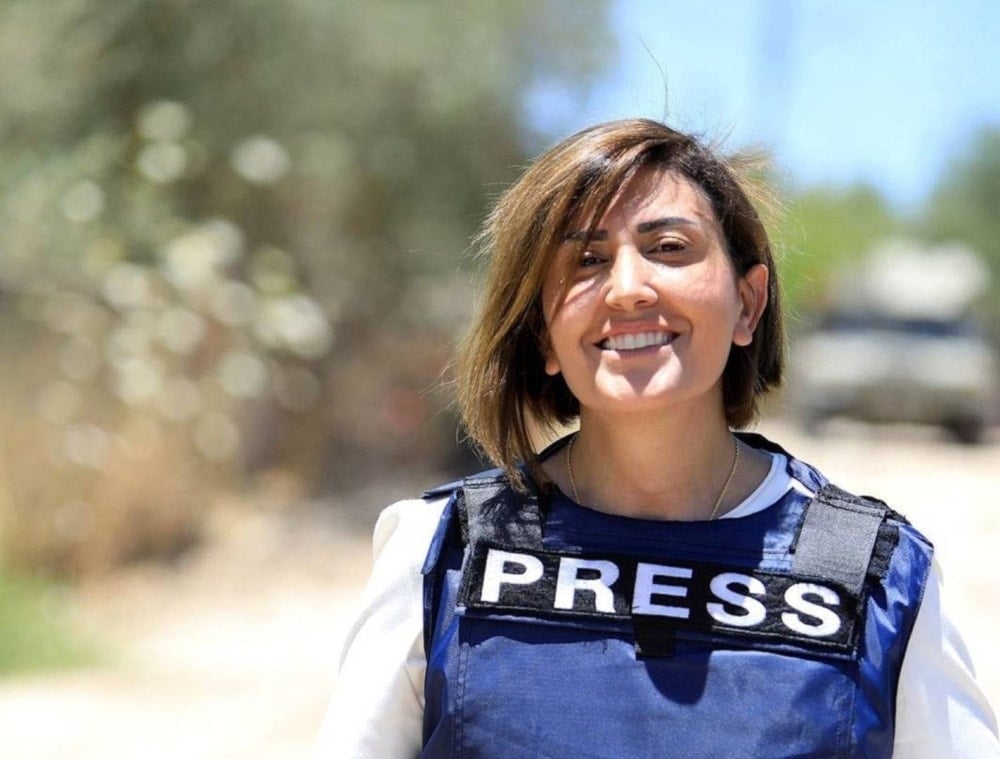To stifle truth, Israelis threaten to decapitate Lebanese journalist
Israelis, armed with US impunity, spares no one in its war on Gaza and aggression on Lebanon, deliberately targeting journalists amid its systematic strategy of silencing the truth.
-

Lebanese journalist Amal Khalil (Social media)
Israeli attempts to silence the truth are relentless, with one method focusing on deliberately targeting journalists who cover the massacres committed by Israeli occupation forces against the Palestinian and Lebanese people, which are crimes against humanity, to say the least.
The latest of such attempts was aimed at Lebanese journalist Amal Khalil, of Al-Akhbar newspaper, who is tasked with covering the Israeli aggression on South Lebanon. Khalil came under a direct threat via WhatsApp, in which a number contacted her and said that "they will decapitate her if she does not leave Lebanon."
Journalist Amal Khalil revealed that she received a message from the Israeli enemy threatening to kill her and demolish her home and calling on her to leave Lebanon. This prompted Khalil to inform the relevant authorities of this matter, "as the enemy has recently resorted to this method against a lot of people."
Speaking to Al Mayadeen, journalist Khalil said that the threat she was subjected to is against every journalist who continues to stand strong in the South, documenting Israeli crimes in video and audio.
"I received a message from an Israeli number on my personal phone on August 25," she recounted in the interview, noting that she contacted the relevant security services, which, in turn, confirmed that this threat was serious and that the number was from inside occupied Palestine.
Khalil recalled the Israeli attacks on journalists in southern Lebanon, which resulted in the martyrdom of Al Mayadeen's correspondent Farah Omar and cameraman Rabie Me'mari, as well as Reuters photojournalist Issam Abdallah, stressing that all Israeli attempts were to intimidate the press crews and force them to leave.
"After nearly a year of the Israeli aggression, many journalists in Palestine and South Lebanon continue to stand strong and remain steadfast," stressing that "all credit for exposing the truth of the Israeli killing machine to the public opinion goes to these steadfast journalists."
"All the bombing and raids will never frighten us," she asserted.
Due process to take place
Commenting on the incident, the head of the Syndicate of Lebanese Press Editors, Joseph al-Qusaifi, denounced the Israeli threat against “our colleague Amal Khalil” and reported informing the Union of Arab Journalists, the International Federation of Journalists, and the relevant UN bodies of the matter to apply due process.
Al-Qusaifi, who was informed of the incident against Khalil, said she was threatened with being killed and her house demolished via social media under an Israeli number.
The Israeli message calls on Khalil to leave not only South Lebanon, where she is stationed, but Lebanon entirely to Qatar “if you want your head to remain attached to your body.”
The message added, "We know where you are, and we will get to you when the time comes."
Expressing solidarity with Khalil, Al-Qusaifi condemned “the insolent threat that violates all international charters, covenants, and laws of protecting journalists in times of war.” He warned the relevant journalist and UN bodies “to be aware of the Zionist scheme against every journalist and media professional doing their professional duty and exposing the deliberate crimes committed by the Israeli war machine against civilians in Gaza, the West Bank, and South Lebanon,” vowing to follow up on the matter.
An enemy terrorized by the truth
Blue helmets and protective shields clearly marked with the word "Press" never protected journalists from Israeli attacks. Rather, the Israeli military deliberately attacks journalists to obscure the facts, through deliberate killing in cold blood, terrorizing and making arrests, and targeting family members, homes, and properties. According to the latest tally by the Government Media Office in Gaza, the number of journalists martyred since the beginning of the aggression and the genocidal war on the Gaza Strip has risen to 172, while hundreds remain detained in Israeli occupation prisons and detention centers, under the most heinous forms of abuse and torture.
In addition to targeting individual journalists and their families, Israeli occupation forces have bombed many foreign and local media HQs inside the Gaza Strip during the past period.
In Lebanon, the Israeli attacks targeted many journalists, including Al Mayadeen's team, which led to the martyrdom of correspondent Farah Omar, cameraman Rabih Me'mari, and their colleague Hussein Aqil by a drone attack. Prior to this incident, Reuters photojournalist Issam Abdallah was martyred and several other journalists were injured, some in serious condition, by a shell from an Israeli tank while they were covering the situation on the border between Lebanon and occupied Palestine.
As a matter of fact, Israeli incitement against journalists and media outlets has extended to the West Bank, as Israeli Prime Minister Benjamin Netanyahu reiterated his call in a government session to shut down the Al Mayadeen Media Network in the region.
"Why are orders against Al Mayadeen in the West Bank not being enforced?" Netanyahu questioned. In response, Communications Minister Shlomo Karhi said that this falls under the authority of Security Minister Yoav Gallant.
Even Israeli Channel 14 made a report on Al Mayadeen, in which it expressed its fear of the channel’s media activity in the West Bank, inciting the renewal of its ban, and expressing its particular displeasure with the meeting with the commander of the Tulkarm Battalion in the al-Quds Brigades, Abu Shujaa.
The far-right channel didn’t stop at mere incitement; it went further by demanding that Israeli Minister of Security Yoav Gallant issue the ban. Gallant, however, is already grappling with numerous complications and challenges, primarily the ongoing resistance his “army” faces in the Gaza Strip, the continued military operations on various fronts—especially in the north—and the mounting problems plaguing his exhausted forces after nearly 11 months of war.

 6 Min Read
6 Min Read










